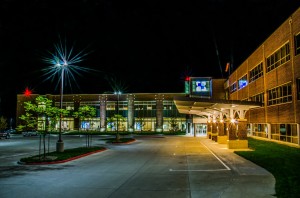Mahaska Health Partnership Explains Appendicitis
MAHASKA COUNTY – Appendicitis, or inflammation of the appendix, can strike at any time and is a medical illness requiring immediate surgery. Mahaska Health Partnership wants to make sure you are aware of the signs and symptoms and when to seek treatment.
“The appendix is a 3.5 inch-long tube that extends from the first part of the large intestine,” MHP General Surgeon Paul Riggs, MD, FACS, explained. “While the function of the appendix is not for certain, we do know that people can live without it and not have consequences to their health.”
While the appendix may not be a vital part of your everyday function, it can cause severe issues if it becomes inflamed. “When a person develops appendicitis, it’s important to seek immediate medical care,” Dr. Riggs urged. “If left untreated, the appendix will eventually burst and fill the abdomen with infectious material. This infectious material can then lead to a serious inflammation of the abdominal cavity’s lining called peritonitis, which can be fatal if not treated immediately.”
In the United States, nearly one in 15 people will get appendicitis. Although it can occur at any age, it rarely occurs in those under age 2 and is most commonly seen between the ages of 10 and 30.
“The beginning of appendicitis is often a blockage of the appendix lumen formed from thickened stool, a foreign object or cancer, and increasing pressure can affect the appendix,” Dr. Riggs shared. “Symptoms can set in fairly quickly and you must seek immediate medical attention if symptoms persist in order to get a timely diagnosis and treatment before it progresses or ruptures.”
One of the initial symptoms of appendicitis is a dull ache near the belly button or upper right abdomen that becomes increasingly sharp as it moves to the lower right abdomen. Additional symptoms include loss of appetite and nausea, abdominal swelling, low-grade fever and inability to pass gas.
“Some individuals may also experience pain elsewhere in the abdomen, back or rectum,” Dr. Riggs continued. “Painful urination, vomiting, severe cramps and constipation or diarrhea may also be warning signs that your appendix is evolving into appendicitis.”
Should you experience any of the symptoms, a trip to the emergency department is the most important first step. “Limit eating or drinking, taking pain medications, antacids or laxatives, as they can mask symptoms while the appendix worsens to rupture,” Dr. Riggs cautioned. “Do not use a heating pad to relieve back pain or stomach cramps either and make sure to not wait it out. Get in and be examined as soon as possible.”
An abdominal CT scan helps to confirm a diagnosis, then a surgeon can arrange for an appendectomy. “An appendectomy is a surgery we can perform laparoscopically, which means only three small incisions will be used to remove the appendix. Antibiotics may also be used to fight infection if necessary.”
Though there is no tried and true way to prevent appendicitis, a healthy diet may reduce your risk of the condition. “Keeping your intestinal contents moving regularly can help prevent blockages,” Dr. Riggs said. “Aim for foods high in fiber such as fresh fruits and vegetables, whole grains, beans, lentils and oatmeal. Make sure to drink plenty of water and, after age 50, get regular colonoscopies to avoid any complications that may come from blockages or polyps.”
General Surgeon Paul Riggs, MD, FACS, is an experienced, Board Certified Surgeon specializing in open, laparoscopic and robotic-assisted surgical treatments. Dr. Riggs commonly performs colonoscopies as well as operations on the gallbladder, colon and appendix. Dr. Riggs feels fortunate to serve in southeast Iowa; providing his surgical skills to patients needing treatment throughout the body’s torso, from the esophagus to the spleen.
Mahaska Health Partnership, located in Oskaloosa, is a non-profit health system accredited by the Joint Commission. It is guided by its mission to provide exceptional customer service and health improvement, linking the science of medicine with the humanity of compassionate care. For more information about how Mahaska Health Partnership is making healthcare personal, visit mahaskahealth.org.
















